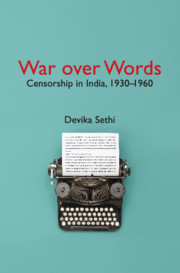Book contents
- Frontmatter
- Dedication
- Contents
- Acknowledgements
- List of Abbreviations
- Introduction
- Part I Guarding the State, Protecting the Public: Censorship Policies and Practices in the 1930s
- Part II Protests and Publicity: Banning Non-Indian Authors
- Part III Political or Military? Censorship in India during the Second World War
- Part IV The Censored Turn Censors: Freedom and Free Speech
- Conclusion
- Epilogue
- Bibliography
- Name Index
- General Index
Epilogue
Published online by Cambridge University Press: 26 April 2019
- Frontmatter
- Dedication
- Contents
- Acknowledgements
- List of Abbreviations
- Introduction
- Part I Guarding the State, Protecting the Public: Censorship Policies and Practices in the 1930s
- Part II Protests and Publicity: Banning Non-Indian Authors
- Part III Political or Military? Censorship in India during the Second World War
- Part IV The Censored Turn Censors: Freedom and Free Speech
- Conclusion
- Epilogue
- Bibliography
- Name Index
- General Index
Summary
What does an account of censorship in India over the course of three decades tell us about free speech in India today? Free speech debates in India are no longer the domain of academics alone, as writers and readers weigh in with their views on the debate; apart from reams of articles in newspapers and magazines and TV debates galore, several anthologies have been published in the last couple of years alone, geared towards the general reading public and active citizenry in India. Free speech is interpreted in its broadest sense, including the freedom to eat what one likes, to dress as one pleases, to speak in a language of one's choice, and to believe (or criticize, as the case may be) in ideologies that appeal to or resonate with one (or, indeed, disgust one). In the public discourse around issues of free speech, the argument is very often made that restricting it is against Indian tradition. In this sense, the argument is that free speech should be allowed to exist today because it was allowed to exist in India for millennia.
While it is possible, fortunately, to find many examples to bolster this assertion, it is also unfortunately true that India has had an equally strong tradition of arguments with, and action against, free speech. Delving into a small slice of its rich and diverse history, a blip in time as it were, this book has highlighted the battle in India between free speech and restraint on expression. The story has taken many unexpected turns: Indians have revelled in reading banned books, and they have facilitated, indeed demanded, the banning of them; Indians have died for the power to express their views, but they have also killed for such a privilege. Indians who were powerless, once they assumed power (in 1937, and after 1946) have demonstrated a volte face on issues of free speech. Other Indians have called them out then, as they do now. What is clear is this: desirable an ideal though free speech is, to make a case for it in India today, we have to return to first-principle arguments, and not to arguments of tradition and history.
- Type
- Chapter
- Information
- War over Words , pp. 262 - 264Publisher: Cambridge University PressPrint publication year: 2019



